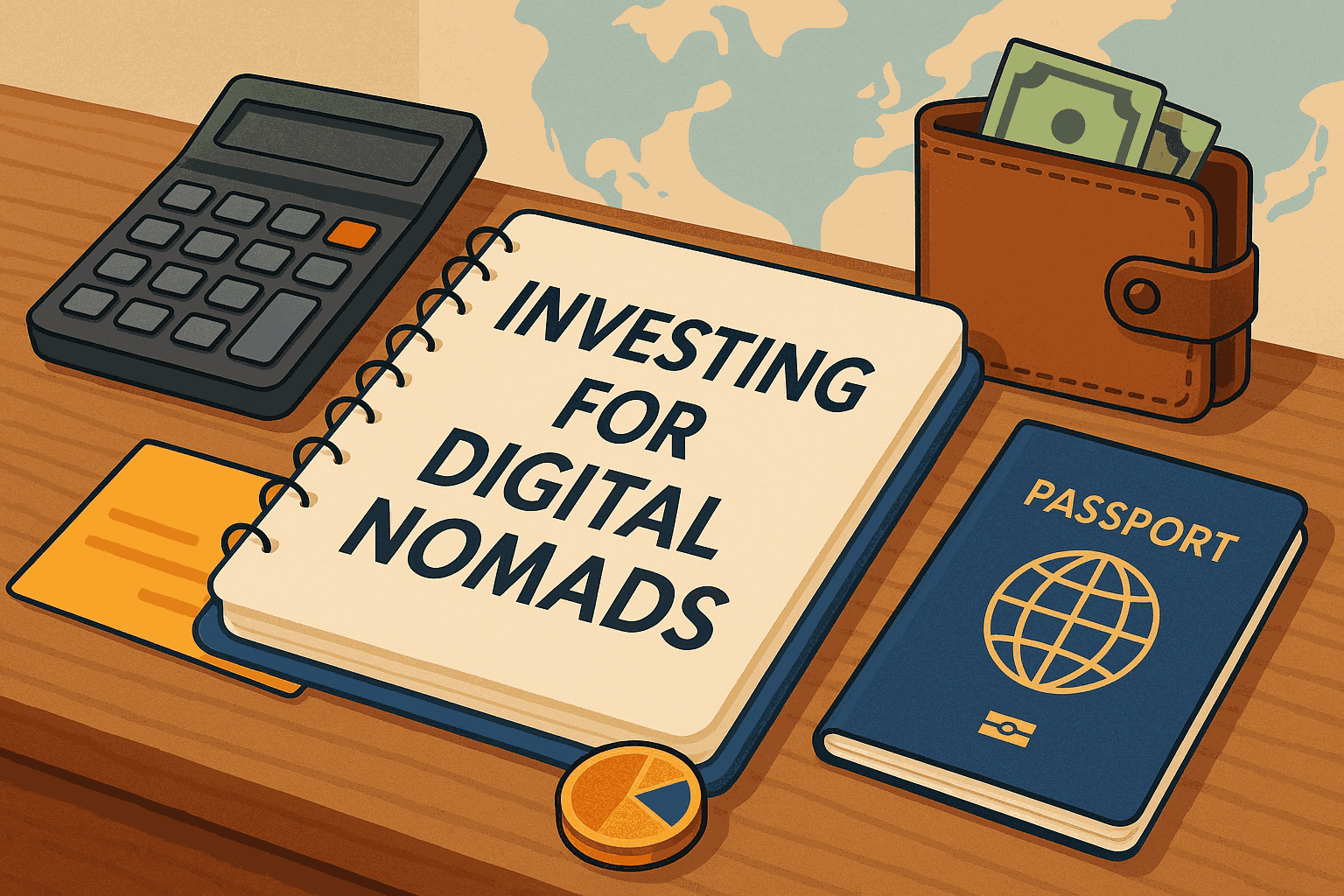
Being a digital nomad offers freedom, flexibility, and adventure — but it also comes with unique challenges, especially when it comes to investing for digital nomads. With no fixed address, changing tax obligations, and international financial barriers, many location-independent professionals struggle to build and maintain a robust investment strategy.
In this blog, we break down smart investment options tailored for digital nomads, covering key tools, global access, and legal considerations so you can grow your wealth while hopping countries.
Why Traditional Investing Doesn’t Work for Nomads
Conventional investing often relies on a stable residency, access to a local bank or brokerage, and consistent tax regulations. Digital nomads, however, face:
- Frequent relocation
- Mixed income sources (freelance, remote employment, passive)
- Residency issues and uncertain tax status
- Limited access to U.S. investment accounts from abroad
- Foreign transaction fees or account restrictions
That’s why it’s essential for nomads to adapt their financial strategies to a mobile lifestyle.
Key Principles of Investing as a Digital Nomad
1. Maintain a Home Base (Legally)
While you may be living around the world, it’s smart to establish a tax domicile or legal residence in one country — ideally with favorable tax laws, stable investment platforms, and friendly expat banking rules.
Many U.S. nomads retain a permanent address in a tax-free state like Florida or Texas to simplify tax filing and investment eligibility.
2. Use U.S. Brokerage Accounts (If Possible)
Keep your U.S. brokerage accounts open and funded before leaving the country. Many brokers like Fidelity, Charles Schwab, and Vanguard allow existing expat customers to retain their accounts, but often restrict opening new ones from abroad due to regulations like FATCA.
If you’re a U.S. citizen, these platforms allow low-cost access to ETFs, index funds, IRAs, and taxable investment accounts.
Best Investment Options for Digital Nomads
3. Index Funds & ETFs
Low-cost index funds and exchange-traded funds (ETFs) are excellent for passive investing. They offer:
- Broad market exposure
- Low management fees
- Consistent growth over time
You can automate investments into these funds using platforms like M1 Finance or Betterment.
4. Robo-Advisors
For hands-off investing, robo-advisors are ideal. These platforms build and manage a diversified portfolio for you based on risk tolerance and goals. Popular options include:
- Betterment
- Wealthfront
- SoFi Automated Investing
Some may restrict usage from abroad, so check their expat policies.
5. Real Estate Crowdfunding
If you can’t or don’t want to manage property abroad, try real estate crowdfunding platforms like Fundrise or RealtyMogul. These allow you to invest in real estate without physical ownership, making them perfect for nomads.
Minimum investments are low, and you receive income through dividends and long-term appreciation.
Alternative Investment Ideas
6. Cryptocurrency
Digital nomads often explore crypto for borderless access and decentralized control. Popular options:
- Bitcoin (BTC) and Ethereum (ETH) as store-of-value assets
- Stablecoins (like USDC) for holding cash
- Staking platforms or DeFi protocols for passive yield
Use hardware wallets like Ledger for security, and only store small amounts on exchanges.
7. Precious Metals or Gold ETFs
While physical gold is tough to carry while traveling, gold ETFs or gold-backed cryptocurrencies offer investment exposure without the logistics.
Retirement Planning On the Go
8. Roth IRA or Traditional IRA
U.S. citizens can still contribute to an IRA as long as they have earned income. Note: Foreign earned income excluded under the FEIE (Foreign Earned Income Exclusion) does not qualify as IRA-eligible income.
Contributions to a Roth IRA offer tax-free growth — ideal for young nomads.
9. Solo 401(k) for Freelancers
If you’re self-employed, a Solo 401(k) allows high contribution limits (up to $69,000 in 2025). Providers like E*TRADE or Rocket Dollar offer expat-friendly options with flexible investment choices, including alternative assets.
Tax Considerations and Compliance
10. Understand FEIE and Foreign Tax Credit
The IRS allows U.S. nomads to reduce or eliminate double taxation through:
- Foreign Earned Income Exclusion (FEIE)
- Foreign Tax Credit (FTC)
Each has its own forms and qualifications, and may impact how you report investment income.
11. Avoid PFICs
Be cautious investing in foreign mutual funds or ETFs while abroad — these are often classified as Passive Foreign Investment Companies (PFICs) and come with punitive tax treatment.
Stick to U.S.-based funds to avoid IRS headaches.
Financial Tools for Nomads
12. Multicurrency Accounts
Services like Wise (formerly TransferWise) and Revolut let you hold and convert multiple currencies, minimizing FX fees while investing or earning abroad.
13. VPN & Secure Logins
Use a VPN to access U.S. investment accounts safely and bypass geo-blocks. Also enable 2FA (Two-Factor Authentication) to prevent security breaches while traveling.
Top Tips to Succeed as a Nomadic Investor
- Automate your savings: Set monthly contributions to your investment accounts.
- Rebalance quarterly: Keep your asset allocation in check.
- Track everything: Use apps like Personal Capital or Monarch Money.
- Avoid emotional decisions: Stay invested even during market dips.
- Check residency laws: Some countries tax global income after 183 days of presence — avoid surprises.
Common Mistakes to Avoid
- Closing U.S. accounts before researching options
- Using foreign platforms without understanding PFIC rules
- Mixing business and personal finances in the same account
- Skipping taxes under the false assumption you’re “out of the system”
- Failing to plan for health emergencies — investing is part of your bigger financial safety net
Final Thoughts
Investing for digital nomads isn’t just possible — it’s essential. With the right strategy, you can grow your wealth from anywhere in the world. Whether you’re freelancing from a co-working space in Lisbon or coding on a beach in Bali, a disciplined investment plan ensures your freedom now and financial independence later.